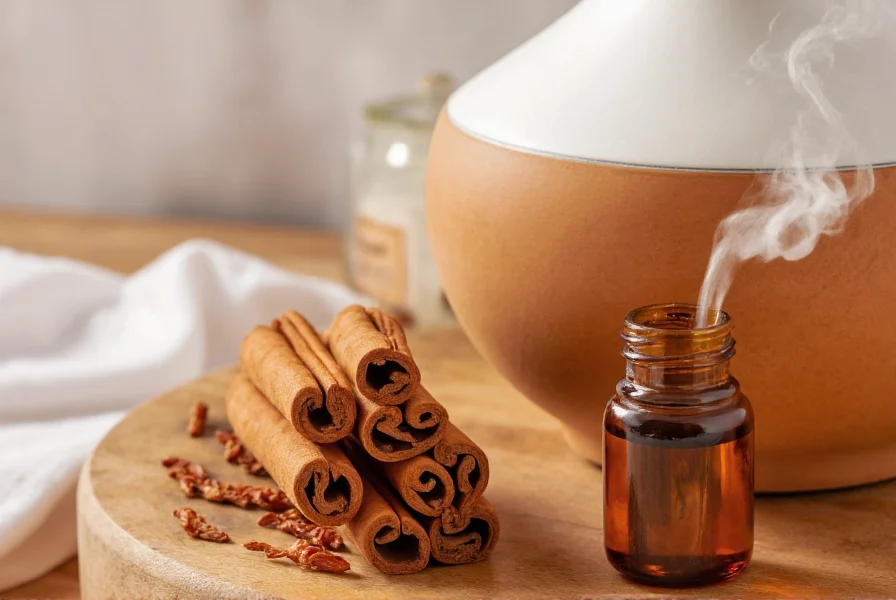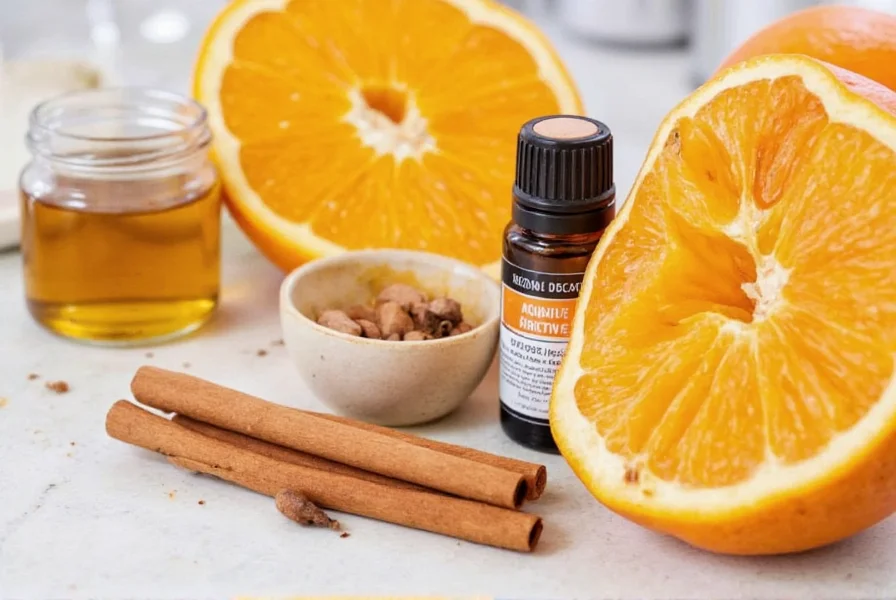Cinnamon air fresheners have gained popularity as a natural alternative to conventional chemical-based products. The distinctive warm, spicy scent of cinnamon doesn't just mask odors—it actively neutralizes them through its natural chemical compounds. This makes cinnamon particularly effective against common household smells like cooking odors, pet smells, and mustiness.
The Science Behind Cinnamon's Air Freshening Properties
Cinnamon contains cinnamaldehyde, the compound responsible for both its flavor and fragrance. This organic compound interacts with odor molecules in the air, effectively neutralizing unpleasant smells rather than simply covering them up. When cinnamon is used as an air freshener, whether through essential oils, potpourri, or simmer pots, it releases these compounds into the environment where they bind with odor-causing particles.
Research shows that cinnamon's antimicrobial properties also help reduce airborne bacteria that can contribute to unpleasant odors. Unlike many synthetic air fresheners that merely mask smells with stronger fragrances, cinnamon works at a molecular level to eliminate odor sources.

Benefits of Natural Cinnamon Air Fresheners
Choosing cinnamon as your air freshening solution offers several advantages over conventional products:
- Natural odor elimination - Works to neutralize rather than mask smells
- Chemical-free formula - Avoids potentially harmful VOCs found in many commercial air fresheners
- Mood enhancement - Cinnamon's scent has been associated with increased alertness and improved mood
- Antimicrobial properties - Helps reduce airborne bacteria
- Versatility - Effective in multiple environments including homes, offices, and vehicles
| Odor Type | Cinnamon Effectiveness | Recommended Application Method |
|---|---|---|
| Cooking odors | High | Simmer pot with cinnamon sticks |
| Pet odors | Moderate to High | Essential oil diffuser |
| Musty smells | Moderate | Cinnamon potpourri |
| Tobacco smoke | Low to Moderate | Combination with citrus oils |
Types of Cinnamon Air Freshening Solutions
Cinnamon air fresheners come in various forms, each with different strengths and applications:
Commercial Cinnamon Air Fresheners
Many companies now offer cinnamon-scented air fresheners in spray, gel, and vent clip formats. When selecting commercial products, look for those that use real cinnamon essential oil rather than synthetic fragrance compounds for the most natural experience and effectiveness.
DIY Cinnamon Air Freshener Recipes
Creating your own cinnamon air freshener allows complete control over ingredients and concentration. Popular methods include:
- Cinnamon Simmer Pot - Boil cinnamon sticks with orange slices and cloves for a warm, inviting home fragrance
- Cinnamon Essential Oil Diffuser Blend - Combine 5-6 drops of cinnamon essential oil with complementary scents like orange or clove
- Dry Cinnamon Potpourri - Mix dried cinnamon sticks with other aromatic elements in a decorative bowl
- Cinnamon Spray - Combine cinnamon essential oil with water and a small amount of vodka as an emulsifier in a spray bottle

Safety Considerations for Cinnamon Air Fresheners
While generally safe, cinnamon air fresheners require some precautions:
- Pet safety - Cinnamon essential oil can be toxic to cats and potentially irritating to dogs in high concentrations. Use diffusers in well-ventilated areas away from pets.
- Human sensitivity - Some individuals may experience respiratory irritation from strong cinnamon scents, particularly those with asthma.
- Surface protection - Cinnamon oil can stain light-colored surfaces; avoid direct contact with fabrics and finishes.
- Proper dilution - When using essential oils, always follow recommended dilution ratios (typically 1-3% for room diffusion).
Maximizing Cinnamon Air Freshener Effectiveness
To get the most from your cinnamon air freshening solution:
- Place air fresheners near odor sources rather than in isolated areas
- Combine cinnamon with complementary scents like citrus for broader odor neutralization
- Refresh DIY solutions regularly as the volatile compounds dissipate
- Use in well-ventilated spaces to allow proper scent distribution
- Consider seasonal application—cinnamon works particularly well during colder months
Cinnamon Compared to Other Natural Air Fresheners
While many natural air freshening options exist, cinnamon offers unique advantages:
- vs. Baking soda - Baking soda absorbs odors but doesn't provide fragrance; cinnamon both neutralizes and adds pleasant scent
- vs. Vinegar - Vinegar eliminates odors but has its own strong smell; cinnamon provides immediate pleasant fragrance
- vs. Citrus - Citrus scents are refreshing but may not address stronger odors as effectively as cinnamon
- vs. Essential oil blends - Cinnamon often serves as a base note in blends due to its long-lasting properties
Common Misconceptions About Cinnamon Air Fresheners
Several myths surround cinnamon air fresheners that deserve clarification:
- Misconception: Cinnamon air fresheners completely eliminate all odors
Reality: While effective against many common household odors, cinnamon may not eliminate extremely strong or persistent smells like sewage or chemical odors - Misconception: All cinnamon-scented products contain real cinnamon
Reality: Many commercial products use synthetic fragrance oils rather than genuine cinnamon compounds - Misconception: Cinnamon air fresheners are completely safe for all pets
Reality: Cinnamon essential oil can be harmful to cats and potentially irritating to dogs in high concentrations
Conclusion
Cinnamon air fresheners provide a natural, effective solution for improving indoor air quality with their distinctive warm fragrance. By understanding how cinnamon works to neutralize odors rather than simply masking them, users can make informed decisions about incorporating this natural option into their homes and vehicles. Whether choosing commercial products or creating DIY solutions, cinnamon offers a versatile air freshening option that combines pleasant fragrance with genuine odor-neutralizing capabilities.
Frequently Asked Questions
How long does a cinnamon air freshener typically last?
The longevity of cinnamon air fresheners varies by type. Simmer pots with cinnamon sticks typically last 2-4 hours of active boiling. Cinnamon essential oil diffusers can remain effective for 4-8 hours depending on concentration and room size. Dry cinnamon potpourri may retain noticeable fragrance for 1-2 weeks before needing refreshment. Commercial cinnamon air freshener sprays generally provide noticeable fragrance for 2-6 hours after application.
Can cinnamon air fresheners help with seasonal allergies?
While cinnamon air fresheners don't directly treat allergies, they may provide some indirect benefits. Cinnamon's natural antimicrobial properties can help reduce certain airborne bacteria and mold spores that might exacerbate allergy symptoms. However, cinnamon essential oil in high concentrations could potentially irritate sensitive individuals. For allergy sufferers, it's generally better to focus on air purification rather than fragrance. Cinnamon should not be considered a treatment for allergies, but rather a complementary approach to creating a pleasant indoor environment.
What's the difference between using cinnamon sticks versus cinnamon essential oil for air freshening?
Cinnamon sticks release fragrance more gradually and subtly through simmering or natural evaporation, providing a milder scent that lasts longer. They're ideal for creating ambient background fragrance. Cinnamon essential oil, being highly concentrated, delivers a stronger, more immediate fragrance but requires careful dilution (typically 1-3% concentration for room diffusion). Essential oil works better in diffusers for targeted odor elimination but may be too intense for some individuals. Sticks are generally safer around pets and children, while essential oil requires more precautions due to its potency.
Are cinnamon air fresheners safe to use in cars?
Yes, cinnamon air fresheners can be safely used in vehicles with some considerations. Vent clips containing cinnamon fragrance are popular and generally safe when used according to instructions. Avoid placing loose cinnamon sticks where they could become a driving hazard. When using essential oils, ensure proper dilution and avoid direct sunlight exposure which can increase oil concentration. Be mindful that strong scents in confined spaces like cars may be overwhelming, so start with milder concentrations. Never leave cinnamon oil products in extreme heat as this can affect their chemical composition and potentially create safety hazards.
Can I combine cinnamon with other natural ingredients for better air freshening results?
Absolutely. Cinnamon blends exceptionally well with several natural ingredients to create more complex and effective air freshening solutions. Citrus fruits like oranges and lemons complement cinnamon's warmth with bright, clean notes that help neutralize a wider range of odors. Cloves add depth and enhance cinnamon's natural properties. Vanilla extract can soften cinnamon's spiciness for a more rounded fragrance. For DIY simmer pots, a combination of cinnamon sticks, orange slices, and whole cloves creates a balanced fragrance profile that addresses multiple odor types. When using essential oils, a 3:2:1 ratio of citrus:cinnamon:vanilla often produces excellent results.











 浙公网安备
33010002000092号
浙公网安备
33010002000092号 浙B2-20120091-4
浙B2-20120091-4